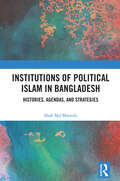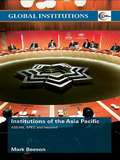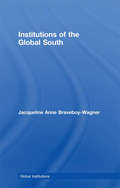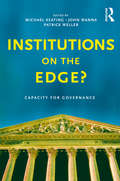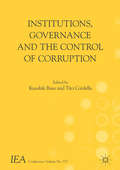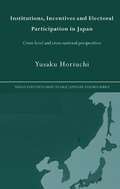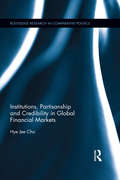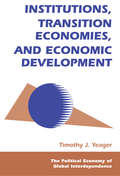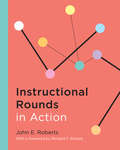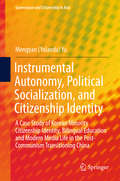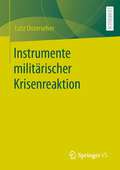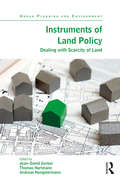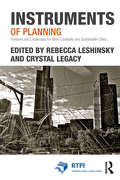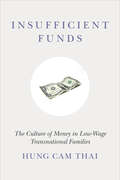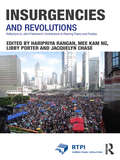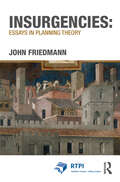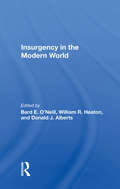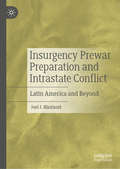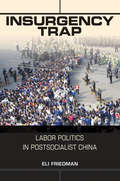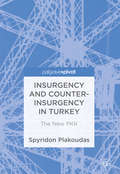- Table View
- List View
Institutions of Political Islam in Bangladesh: Histories, Agendas, and Strategies
by Shafi Md MostofaThis book examines the socio-political histories, religio-political agendas and politico-militant (and for some, non-violent) strategies of institutions of political Islam in Bangladesh. Focusing on Jammat-e-Islami, Hefazet-e-Islam, Jammatul Mujahedeen Bangladesh (JMB), Ansar al Islam, Neo-Jammatul Mujahedeen Bangladesh (Neo-JMB), Tablighi Jamaat, and Islami Andolon Bangladesh, it shows how these groups are key actors in the securitization of the postcolonial socio-cultural, economic, and political histories (and future) of Bangladesh.The volume illustrates the complex ways in which every day lived experiences of peoples of Bangladesh, and securitized political and cultural pathways of state governance have shaped and impacted the histories and activities of these groups, and the strategies and agendas of these groups to gain political and socio-religious legitimacy within (and sometimes, beyond) the secularized cultural landscapes of Bangladesh. Moreover, the book argues that even though these Islamist groups bear the same agenda of transforming Bangladesh into an Islamic state, their strategies are different and unique. It also discusses the connections of some of these groups to other transnational institutions of political Islam and extremist groups such as Al-Qaeda and the Islamic State (IS).This book will be a major intervention in the field of politics, religion, and South Asian studies.
Institutions of the Asia-Pacific: ASEAN, APEC and beyond (Global Institutions)
by Mark BeesonThe Asia-Pacific is arguably the most important, but also the most complex and contested, region on the planet. Containing three of the world’s largest economies and some of its most important strategic relationships, the region’s capacity of regional elites to promote continuing economic development whilst simultaneously maintaining peace and stability will be one of the defining challenges of the twenty-first century international order. Intuitively, we might expect regional institutions to play a major role in achieving this. Yet one of the most widely noted characteristics of the Asia-Pacific region has been its relatively modest levels of institutional development thus far. However, things are changing: as individual economies in the Asia-Pacific become more deeply integrated, there is a growing interest in developing and adding to the institutions that already exist. Institutions of the Asia-Pacific examines how this region is developing, and what role established organisations like APEC and new bodies like ASEAN Plus Three are playing in this process. An expert in the field, Mark Beeson introduces the contested nature of the very region itself – should it be the ‘Asia-Pacific’ or ‘East Asia’ to which we pay most attention and expect to see most institutional development. By placing these developments in historical context, he reveals why the very definition of the region remains unsettled and why the political, economic and strategic relations of this remarkably diverse region remain fraught and difficult to manage.
Institutions of the Global South: Third World (Global Institutions #Vol. 29)
by Jacqueline Anne Braveboy-WagnerWhile clearly assessing the achievements, performance and responses of major global south institutions to global change, Jacqueline Anne Braveboy-Wagner shows how and why such arrangements are critical in the South’s efforts to call the international community’s attention to their concerns and to resolve their special problems. Focusing on a range of key areas to provide the reader with a well-rounded understanding of this important subject in international affairs, the book: offers a rationale for the institutional development in the global South elaborates on the scope of membership, structure, aims, and problems of such institutions assesses the utility of tri-continental political and economic organizations examines the history and activities of region-wide organizations evaluates the potential of sub-regional integration arrangements analyses the applicability of various theories, and makes suggestions with respect to the study of global South institutions. The lack of a comprehensive and accessible compilation of institutions of key importance to the global South in the post-war period, makes this book essential reading to students and scholars in the fields of in international organization, international politics, foreign policy, international development, and global south public policies.
Institutions on the edge?: Capacity for governance
by Michael Keating John Wanna Patrick WellerAustralia faces major challenges to its forms of governance. Changing expectations from its citizens, global pressures on the economy and technological innovation are impacting on government operations. Yet most of its institutions were designed a hundred years ago. Cabinet government was inherited. Parliament was already established in its forms and procedures. The federal structure, the High Court and the federal public service were created as a consequence. The party structure has been effectively frozen since the 1920s and a tradition of handing some responsibilities to arms-length organisations was well established.So how have these institutions changed over the last hundred years and how well will they adapt to the demands of the modern world? Do they have the capacity to adapt appropriately and enable governments to achieve their preferred outcomes? In this book experienced academics and practitioners explore these questions. They examine each of the institutions in terms of their ability to meet new challenges and provide some hope that Australia's institutions, even if at times slow to move and dominated by internal interests, have a capacity to adapt and govern effectively. The book shows our political institutions in a new light, as dynamic, often flexible organisms; it provides important new insights into the way we are governed and how our system of governance might develop in the future.
Institutions, Governance and the Control of Corruption (International Economic Association Series)
by Kaushik Basu Tito CordellaThis book considers how emerging economies around the world face the challenge of building good institutions and effective governance, since so much of economic development depends on having these in place. The promotion of shared prosperity and the battle against poverty require interventions to reach out to the poor and the disadvantaged. Yet time and again we have seen such effort foild or diminished by corruption and leakage. The creation of good governance and institutions and structures to combat corruption require determination and passion but also intricate design rooted in data, analysis, and research. In this book, leading researchers from around the world bring to the table some of the best available ideas to help create better governance structures, design laws for corruption control, and nurture good institutions.
Institutions, Human Development and Economic Growth in Transition Economies
by Pasquale TridicoThis book analyses the development path of transition economies in European Countries and former Soviet Republics that have experienced the transformation from planned economies to market economies since the fall of the Berlin wall in 1989. It examines economic growth, institutional change and human development performance.
Institutions, Ideas and Leadership in Russian Politics
by Julie Newton William TompsonA stimulating and thought-provoking collection that challenges some of the emerging conventional wisdom about contemporary Russia. It examines the role of leadership, institutions and ideas, and the interactions among them, in shaping Russia's post-Soviet transformation.
Institutions, Incentives and Electoral Participation in Japan: Cross-Level and Cross-National Perspectives (Nissan Institute/Routledge Japanese Studies)
by Yusaku HoriuchiAmerican and European political scientists have claimed that subnational elections almost always record lower voter turnout than national elections. In Japan, however, municipal elections often record considerably higher turnout than national elections, particularly in small towns and villages. Institutions, Incentives and Electoral Participation in Japan theoretically and empirically explores this puzzling 'turnout twist' phenomenon from comparative perspectives. Based on the rational-choice approach, the book hypothesizes that relative voter turnout in subnational vs. national elections is determined by the relative magnitudes of how much is at stake ('election significance') and how much votes count ('vote significance') in these elections.
Institutions, Partisanship and Credibility in Global Financial Markets (Routledge Research in Comparative Politics)
by Hye Jee ChoIncreasingly integrated global financial markets have been shaken by a series of severe shocks in recent decades, from Mexico’s Tequila crisis to the upheavals in the Eurozone. These crises have demonstrated that signs of uncertain local economic and political conditions can result in market fluctuations which in turn cause economic, social, and political instability. Such instability is particularly severe for developing countries that rely heavily on international financial markets for their financial needs. Building credibility in these markets is therefore important for national governments who wish to prevent market panic and capital flight and, ultimately, to achieve stable economic growth. Earlier studies have argued that institutional arrangements that constrain governments and commit them to protecting private property rights and market-friendly policies can send a strong positive signal to the markets about a given country’s sovereign credibility. This book argues, however, that the market perception of such credibility-building institutions is significantly contingent on which party governs the country. Formal institutions confer significant credibility-building effects on left-wing governments, whereas less or no significant effects are enjoyed by right-wing governments. And beyond that, any significant changes in a country’s institutional landscape—such as a breakdown of democracy or joining an international organization that can influence domestic politics—have particularly strong impact on the credibility of left-wing governments. This argument is supported by a quantitative analysis of sovereign credit ratings data collected from around 90 developing countries from 1980 to 2007, by case studies from South Asia, Eastern Europe and Latin America, and by face-to-face interviews with 24 financial market experts based in Hong Kong, Seoul, and Paris.
Institutions, Transition Economies, And Economic Development (Political Economy Of Global Interdependence Ser.)
by Tim YeagerWhy are some nations wealthy while others are desperately poor? Despite the rapid advancement of technology and the free flow of information provided by computers, many poor nations are falling further behind the wealthy nations of the world. Why is it that these poorer nations cannot catch up? Until recently, economic theory provided limited help in answering these questions. But the New Institutional Economics, a rapidly growing body of economic theory, may provide the answers. Timothy Yeager's Institutions, Transition Economies, and Economic Development clearly explains the New Institutional Economics, and applies its tenets to the transition economies of Poland and Russia. Readers will gain a perspective on transition and developing economies that has never been explored before in a single book.
Instructional Rounds in Action
by Richard E. Elmore John E. RobertsInstructional Rounds in Action is an invaluable guide for those involved in implementing instructional rounds as the foundation and framework for systemic improvement in schools. Over the past few years, districts across the United States, Canada, and Australia have begun implementing "instructional rounds," a set of ideas and practices for advancing systemic, district-wide improvement. But as they do so, practical and theoretical questions arise. <P><P>Roberts offers a powerful analysis of how instructional rounds can work "on the ground." His book weaves together the voices of stakeholders at all levels--teachers, principals, and district personnel--and presents a number of protocols to support instructional rounds.
Instructional Rounds in Action: NULL
by John E. RobertsInstructional Rounds in Action is an invaluable guide for those involved in implementing instructional rounds as the foundation and framework for systemic improvement in schools. Over the past few years, districts across the United States, Canada, and Australia have begun implementing &“instructional rounds,&” a set of ideas and practices for advancing systemic, district-wide improvement. But as they do so, practical and theoretical questions arise. Roberts offers a powerful analysis of how instructional rounds can work &“on the ground.&” His book weaves together the voices of stakeholders at all levels—teachers, principals, and district personnel—and presents a number of protocols to support instructional rounds.
Instrumental Autonomy, Political Socialization, and Citizenship Identity
by Mengyan Yolanda YuThis book offers essential insights into Chinese Korean minority youth citizenship identity development during their high school and university education period out of their political socialization experience. It investigates how they develop their citizenship identity with the state through bilingual education and media exposure, as an outcome of the entangled relationship between state power and economic globalization. The book demonstrates to readers how to apply the abstract conceptual framework of identity politics and ideology construction, nurtured by both civil culture and political evolvement, to a specific case with operationalized measurement extracted from political socialization concepts so as to understand and rationalize identity development. This approach offers both an in-depth way to penetrate further in the discourse construction that shapes identity politics and an innovative means of measuring and explaining relevant relationships.
Instrumente militärischer Krisenreaktion
by Lutz UnterseherNach den jüngsten Desastern bewaffneter Machtprojektion wird in diesem Buch unternommen, einen rationalen Diskurs über militärische Krisenintervention wiederzubeleben: im Sinne einer stabilitätsorientierten Sicherheitspolitik. Dabei werden Elemente der Landstreitkräfte auf ihre Eignung hin untersucht.
Instruments of Land Policy: Dealing with Scarcity of Land (Urban Planning and Environment)
by Thomas Hartmann Jean-David Gerber Andreas HengstermannIn dealing with scarce land, planners often need to interact with, and sometimes confront, property right-holders to address complex property rights situations. To reinforce their position in situations of rivalrous land uses, planners can strategically use and combine different policy instruments in addition to standard land use plans. Effectively steering spatial development requires a keen understanding of these instruments of land policy. This book not only presents how such instruments function, it additionally examines how public authorities strategically manage the scarcity of land, either increasing or decreasing it, to promote a more sparing use of resources. It presents 13 instruments of land policy in specific national contexts and discusses them from the perspectives of other countries. Through the use of concrete examples, the book reveals how instruments of land policy are used strategically in different policy contexts.
Instruments of Planning: Tensions and challenges for more equitable and sustainable cities (RTPI Library Series)
by Rebecca Leshinsky Crystal LegacyInstruments of Planning: Tensions and Challenges for more Equitable and Sustainable Cities critically explores planning’s instrumentality to deliver important social and environmental outcomes in neoliberal planning landscapes. Because each instrument is unique and may be tailored to its own jurisdictional needs, Instruments of Planning is a compendium of case studies from urban regions in Australia, Canada, the United States and Europe, providing readers with a collection that critically challenges the role and potential of planning instruments and instrumentality across a range of contexts. Instruments of Planning captures the political, institutional, and economic challenges that confront planning. It examines planning instruments designed to assist with strategic planning and implementation, and considers the role that technology plays in unpacking and understanding complexity in planning. Written by Rebecca Leshinsky and Crystal Legacy of RMIT University in Melbourne, Australia, this book fills the gap in planning theory about the instrumentality of planning in the neoliberal urban context. It is essential reading for students, urban researchers, policy analysts and planning practitioners.
Insufficient Funds: The Culture of Money in Low-Wage Transnational Families
by Hung Cam ThaiEvery year migrants across the globe send more than $500 billion to relatives in their home countries, and this circulation of money has important personal, cultural, and emotional implications for the immigrants and their family members alike. Insufficient Funds tells the story of how low-wage Vietnamese immigrants in the United States and their poor, non-migrant family members give, receive, and spend money. Drawing on interviews and fieldwork with more than one hundred members of transnational families, Hung Cam Thai examines how and why immigrants, who largely earn low wages as hairdressers, cleaners, and other "invisible" workers, send home a substantial portion of their earnings, as well as spend lavishly on relatives during return trips. Extending beyond mere altruism, this spending is motivated by complex social obligations and the desire to gain self-worth despite their limited economic opportunities in the United States. At the same time, such remittances raise expectations for standards of living, producing a cascade effect that monetizes family relationships. Insufficient Funds powerfully illuminates these and other contradictions associated with money and its new meanings in an increasingly transnational world.
Insurance Economics
by Peter Zweifel Roland EisenInsurance Economics brings together the economic analysis of decision making under risk, risk management and demand for insurance by individuals and corporations, objectives pursued and management tools used by insurance companies, the regulation of insurance, and the division of labor between private and social insurance. Appropriete both for advanced undergraduate and graduate students of economics, management, and finance, this text provides the background required to understand current research. Predictions derived from theoretical argument are not only stated but confronted with empirical evidence. Throughout the book, conclusions summarize results, helping readers to check their knowledge and understanding. Issues discussed include paradoxa in decision making under risk, selection of favorable risks by insurers, the possibility of a "death spiral" in insurance markets, and future challenges such as re-regulation in the wake of the 2007-09 financial crisis and the increasing availability of generic information.
Insurance Settlements
by Ronald MillerInsurance Settlements Increase settlement values with this insider's guide to the insurance settlement process. Insurance Settlements opens long-locked doors to insurance claims departments, gathering the experience of more than 25 veteran claims managers, attorneys, medical experts, and adjusters. Discover in days what most plaintiffs' attorneys take years to learn. This book reveals how to: * Demonstrate to the adjuster that you know what you are doing * Determine when and what to say for maximum impact * How to help the adjuster sell your client's damages to his superiors * Draft effective demand letters * Evaluating soft tissue injuries * Break cases free from common logjams * Prove pain and suffering * Get realistic offers from adjusters * Counter common insurance settlement tactics * Value cases using traditional insurance company techniques * Obtain top dollar
Insurgencies and Revolutions: Reflections on John Friedmann’s Contributions to Planning Theory and Practice (RTPI Library Series)
by Libby Porter Haripriya Rangan Mee Kam Ng Jacquelyn ChaseOver the past six or more decades, John Friedmann has been an insurgent force in the field of urban and regional planning, transforming it from its traditional state-centered concern for establishing social and spatial order into a radical domain of collaborative action between state and civil society for creating ‘the good society’ in the present and future. By opening it up to theoretical engagement with a wide range of disciplines, Friedmann’s contributions have revolutionised planning as a transdisciplinary space of critical thinking, social learning, and reflective practice. Insurgencies and Revolutions brings together former students, close research associates, and colleagues of John Friedmann to reflect on his contributions to planning theory and practice. The volume is organized around five broad themes where Friedmann’s contributions have risen to challenge established paradigms and generated the space for revolutionary thinking and action in urban and regional planning – Theorising hope; Economic development and regionalism; World cities and the Good city; Social learning, empowered communities, and citizenship; and Chinese cities. The essays by the authors reflect their engagement with his ideas and the new directions in which they have taken these in their work in planning theory and practice.
Insurgencies: Essays in Planning Theory (RTPI Library Series)
by John FriedmannFor nearly fifty years John Friedmann's writings have not just led the academic study of the discipline, but have given shape and direction to the planning profession itself. Covering transactive planning, radical planning, the concept of the Good City, civil society, rethinking poverty and the diversity of planning cultures, this collection of Friedmann's most important and influential essays tells a coherent and compelling story about how the evolution of thinking about planning over several decades has helped to shape its practice. With each essay given a new introduction to establish its context and importance, this is an ideal text for the study of planning theory and history.
Insurgency In The Modern World
by Bard E. O'Neill William R. Heaton Donald J. AlbertsWhile all instances of insurgency have elements in common, the circumstances that precipitate them and the forms they take vary immensely. The editors of this book synthesize the literature on insurgency to provide an analytical framework that outlines categories of insurgent movements (secessionist, revolutionary, restorational, reactionary, conse
Insurgency Prewar Preparation and Intrastate Conflict: Latin America and Beyond
by Joel J. BlaxlandThis book provides a new approach to explaining prolonged rebellions and insurgent wars, as well as a more nuanced and multi-faceted account of the entire lifespans of rebel and insurgent groups. Since 1945, rebel and insurgent groups have increasingly dragged larger, better funded, and ostensibly militarily superior regimes into protracted intrastate conflicts. This book demonstrates how they were able to endure the hardships of warfare thanks to decisions made before the conflict erupted––a period of time the author refers to as “incubation.” Using case studies on Latin American insurgencies, the author demonstrates that their capacity to endure was directly associated with both the length and quality of each group’s prewar preparations.
Insurgency Trap: Labor Politics in Postsocialist China
by Eli FriedmanDuring the first decade of the twenty-first century, worker resistance in China increased rapidly despite the fact that certain segments of the state began moving in a pro-labor direction. In explaining this, Eli Friedman argues that the Chinese state has become hemmed in by an "insurgency trap" of its own devising and is thus unable to tame expansive worker unrest. Labor conflict in the process of capitalist industrialization is certainly not unique to China and indeed has appeared in a wide array of countries around the world. What is distinct in China, however, is the combination of postsocialist politics with rapid capitalist development.Other countries undergoing capitalist industrialization have incorporated relatively independent unions to tame labor conflict and channel insurgent workers into legal and rationalized modes of contention. In contrast, the Chinese state only allows for one union federation, the All China Federation of Trade Unions, over which it maintains tight control. Official unions have been unable to win recognition from workers, and wildcat strikes and other forms of disruption continue to be the most effective means for addressing workplace grievances. In support of this argument, Friedman offers evidence from Guangdong and Zhejiang provinces, where unions are experimenting with new initiatives, leadership models, and organizational forms.
Insurgency and Counter-Insurgency in Turkey: The New Pkk
by Spyridon PlakoudasThis book seeks to answer the “why” and “how” questions about the insurgency of the PKK, a militant left-wing group of Turkey’s Kurds, in Turkey. The PKK has been inter-locked in an intermittent war against Turkey since 1984 in the name of Kurdish nationalism. The author combines insights of Strategy and IR - from strategy and tactics in irregular warfare to peace negotiations between state authorities and insurgents, with data from qualitative research, to achieve two inter-related objectives: first, assess the current state of affairs and predict the future course of the conflict and, secondly, draw general conclusions on how protracted conflicts can end and how.
